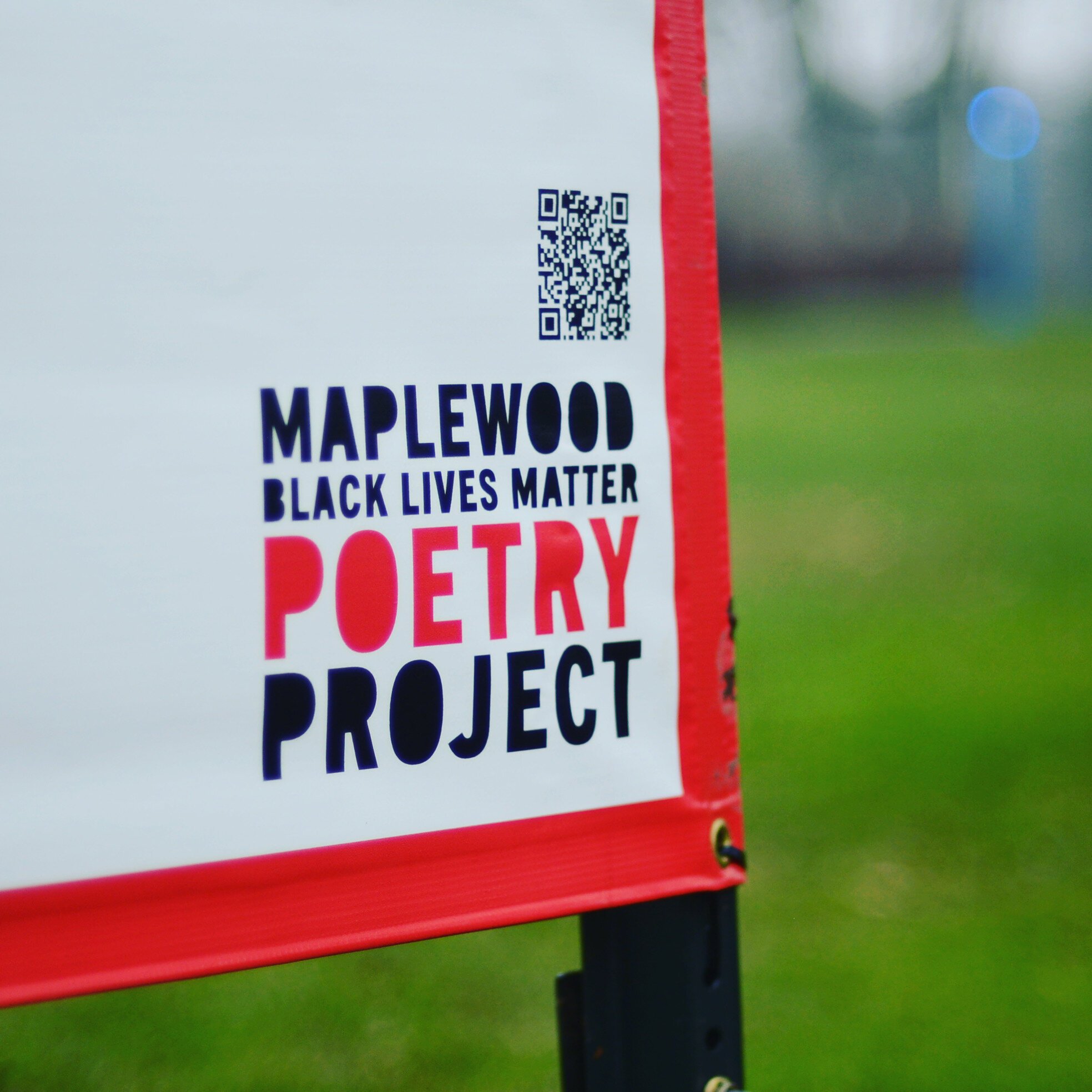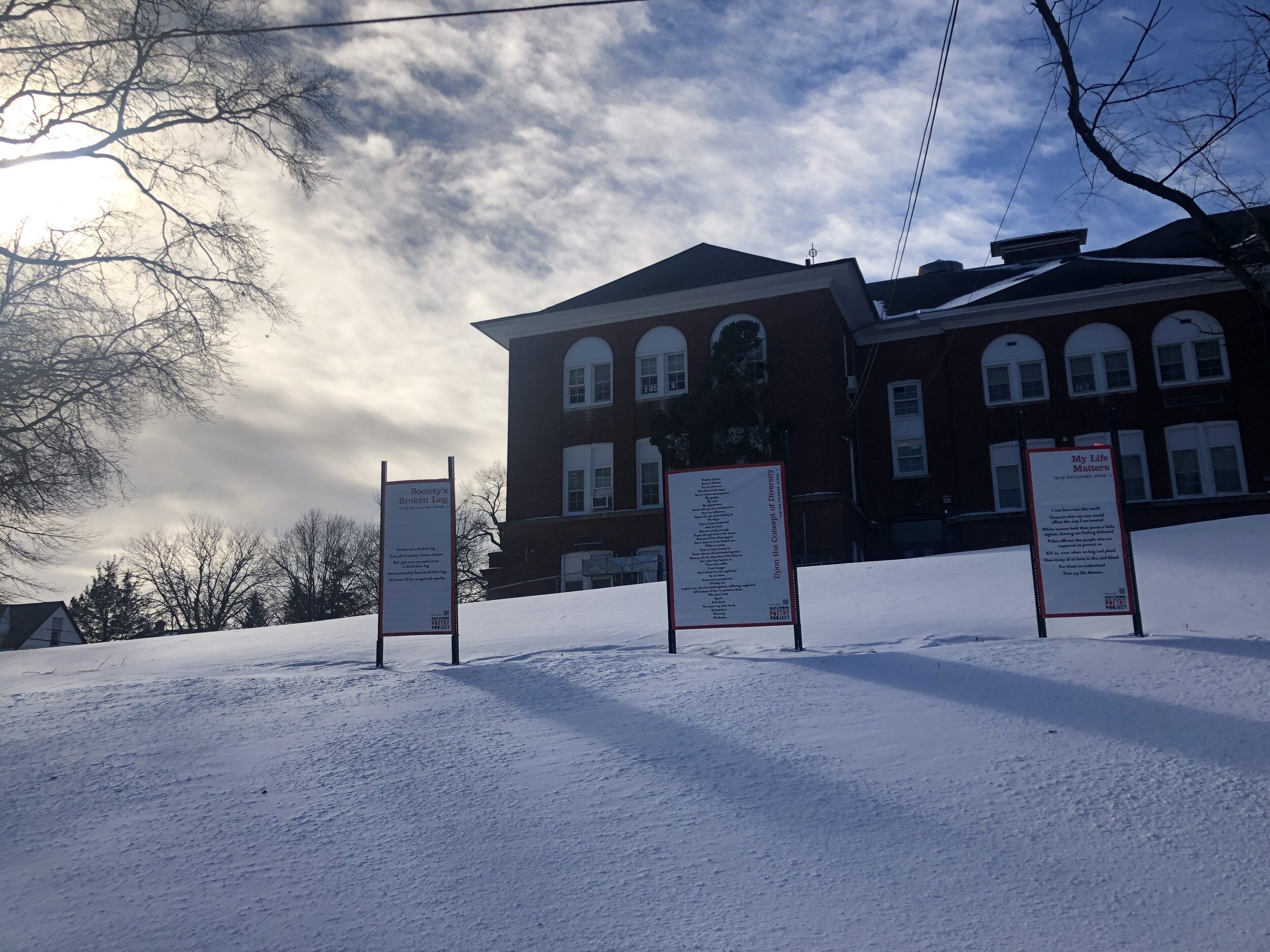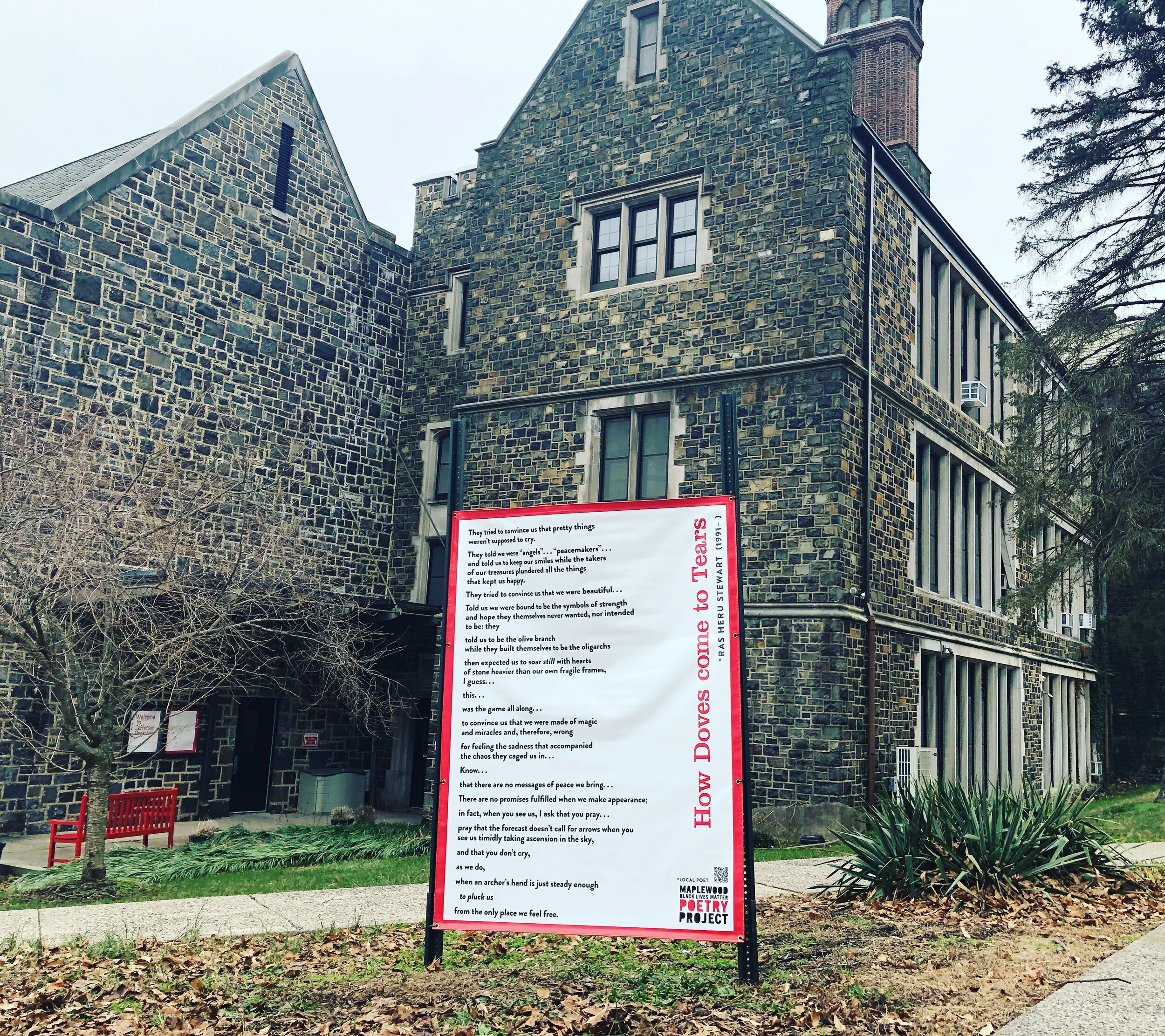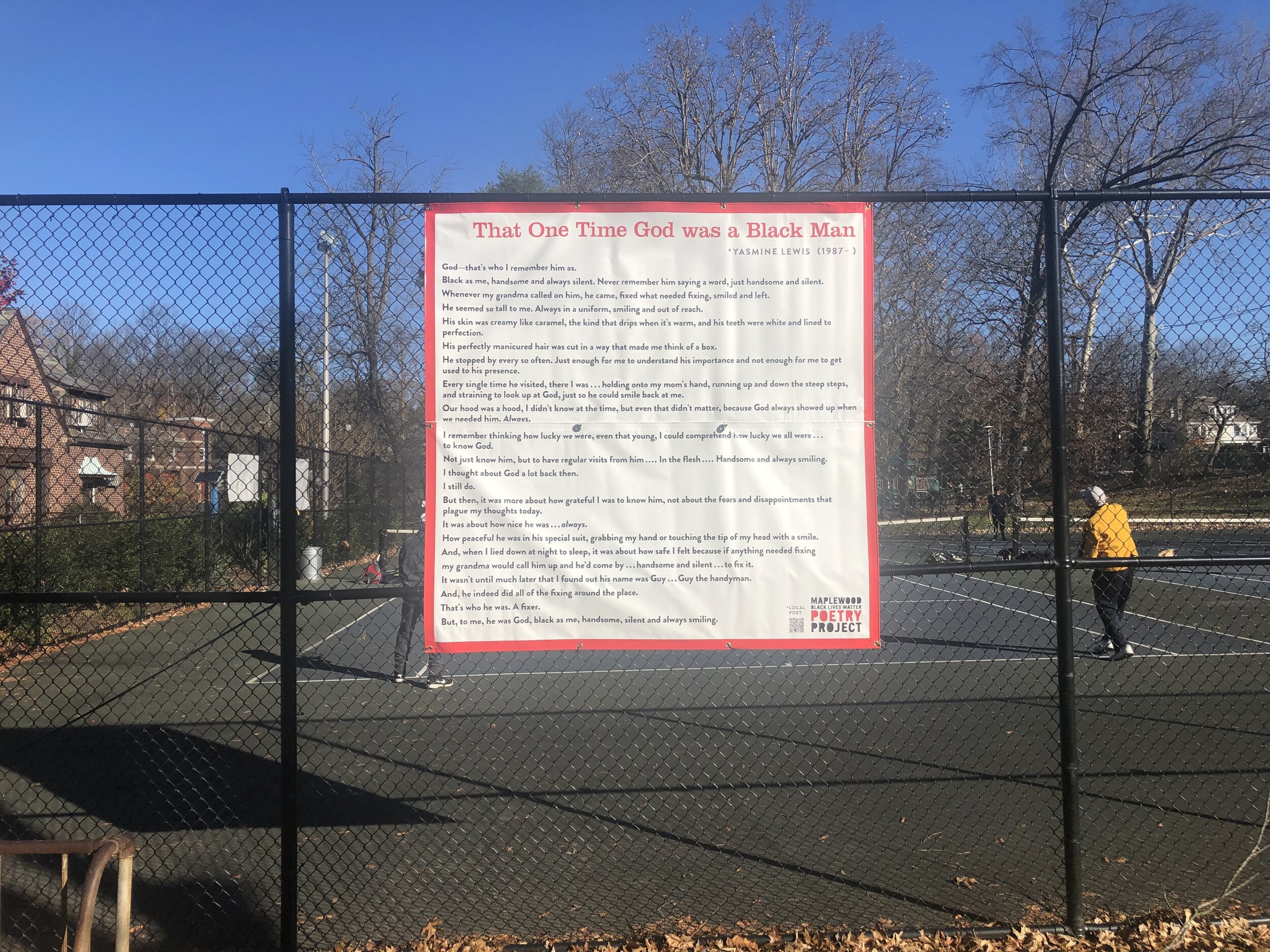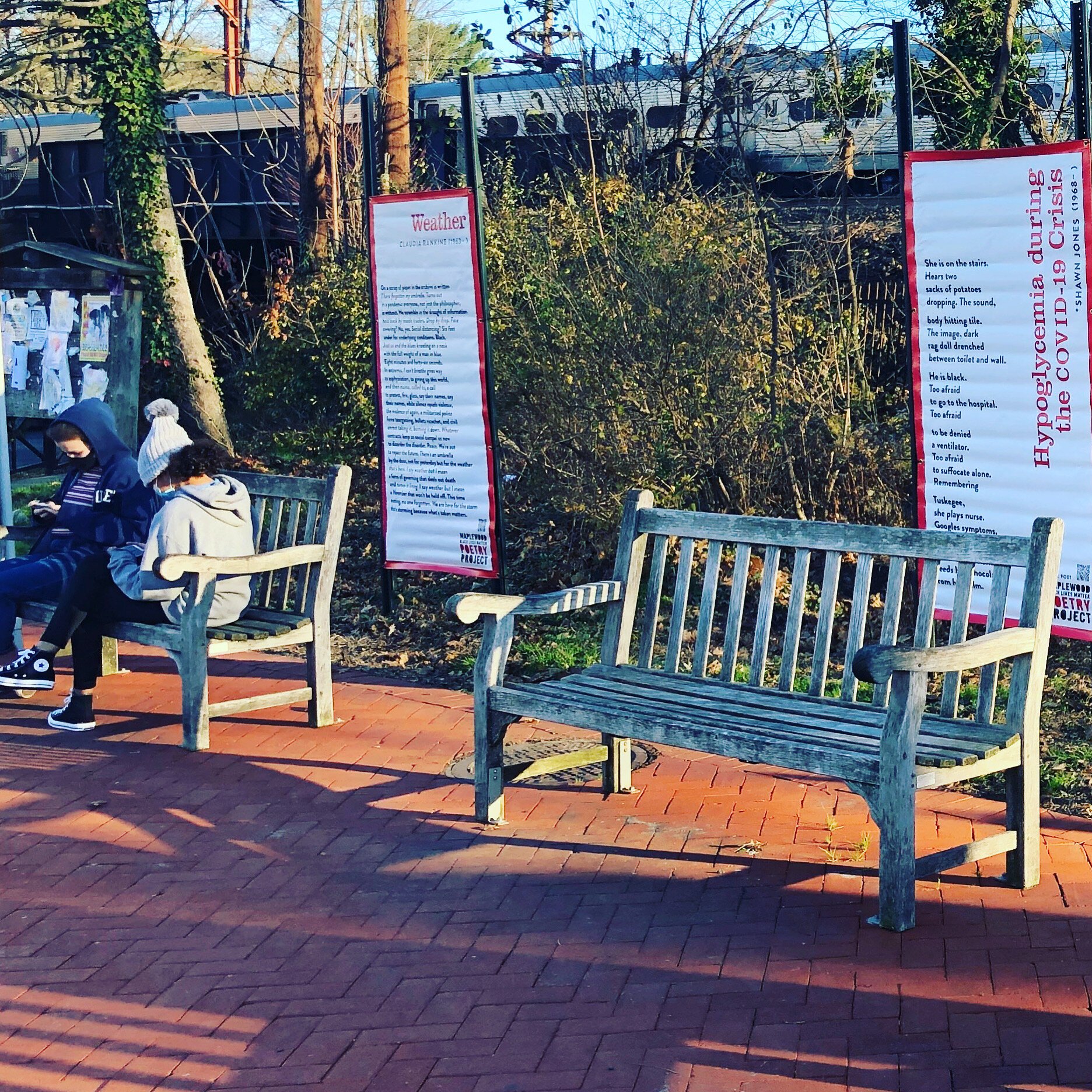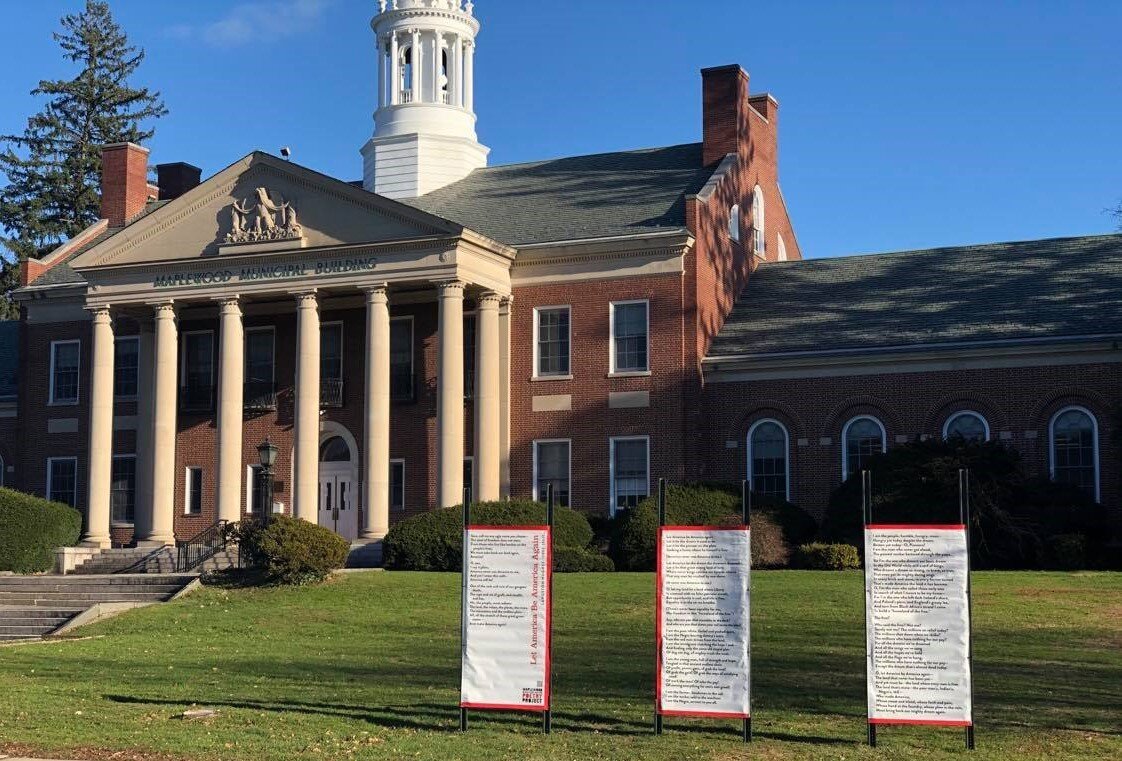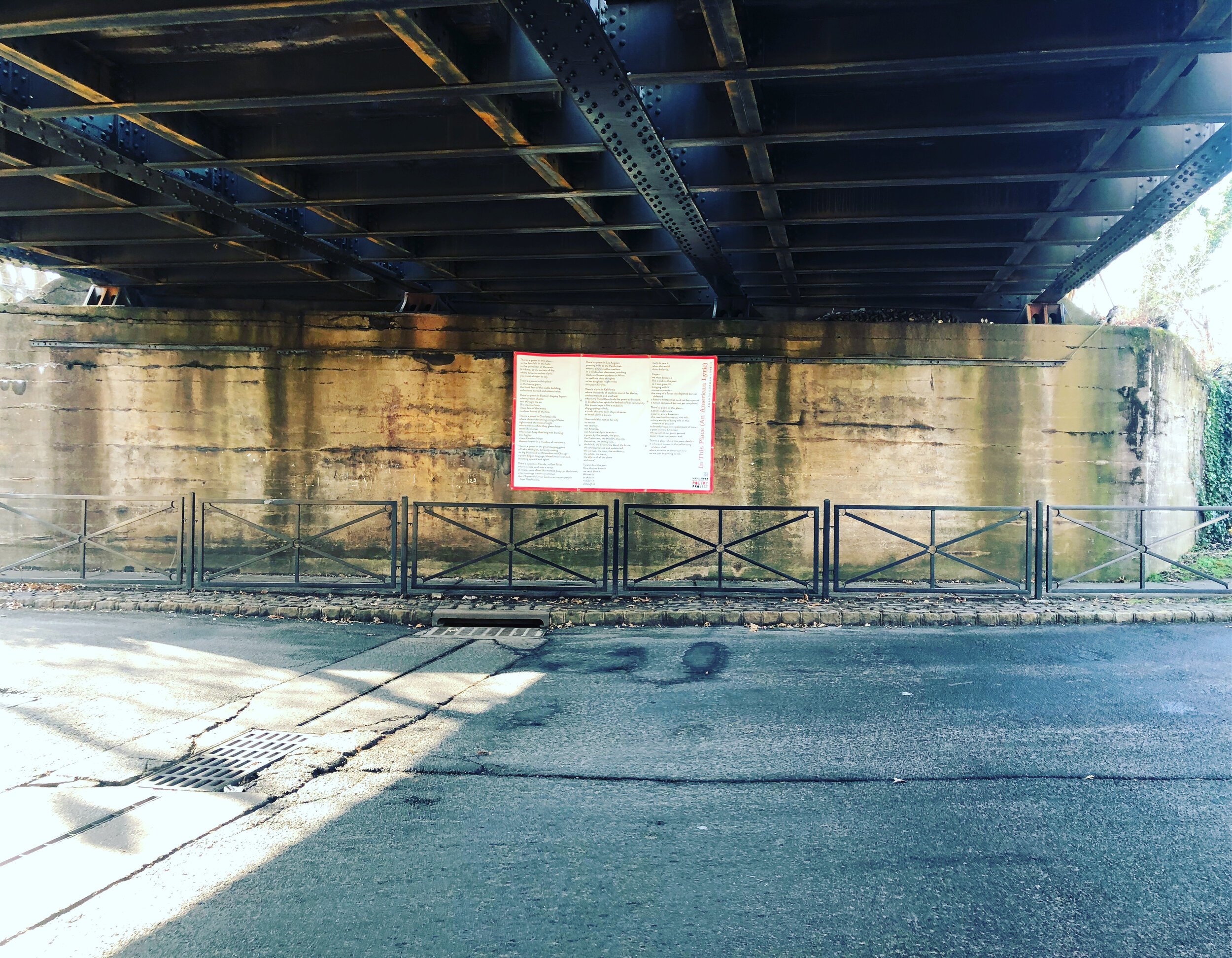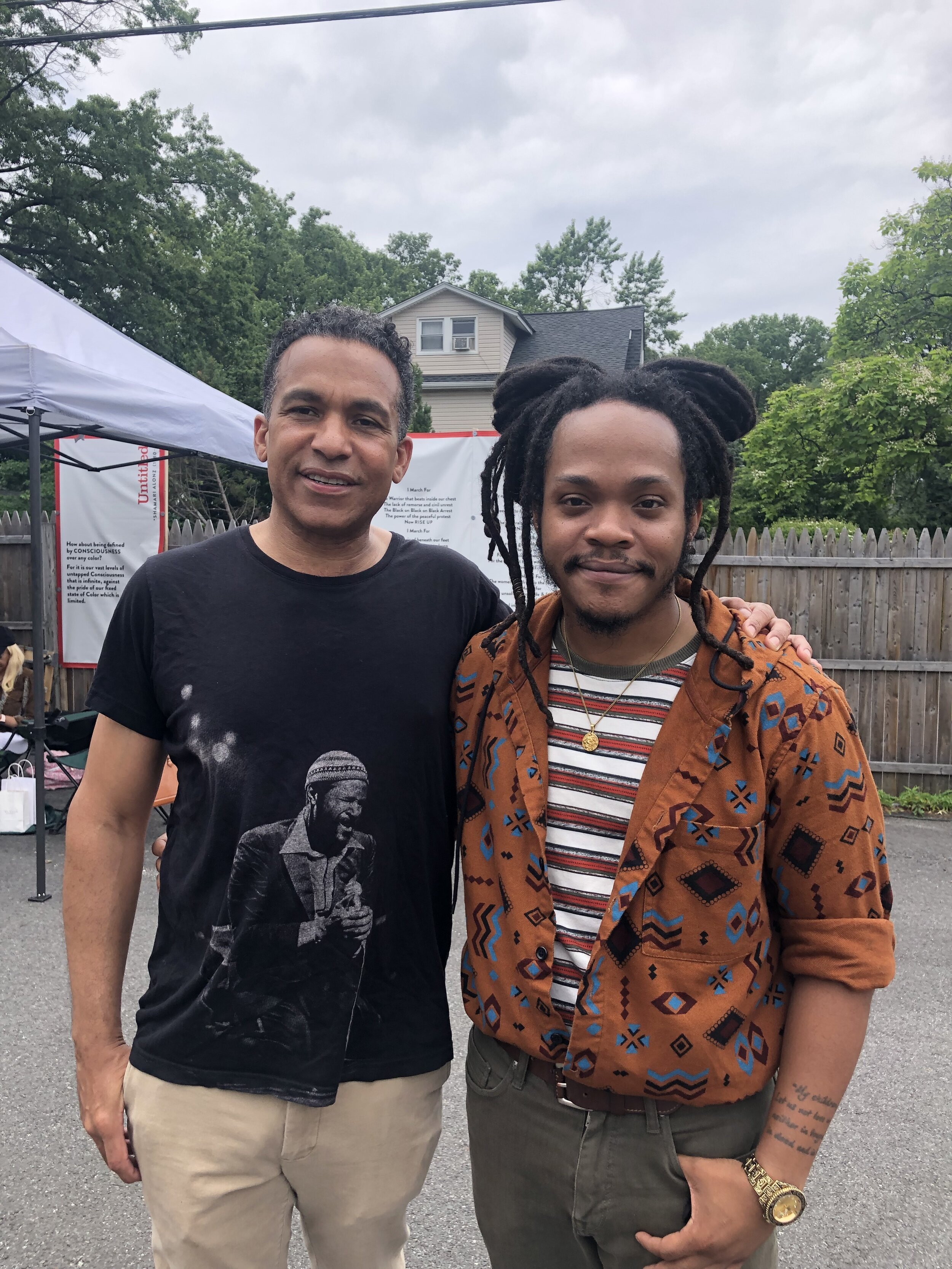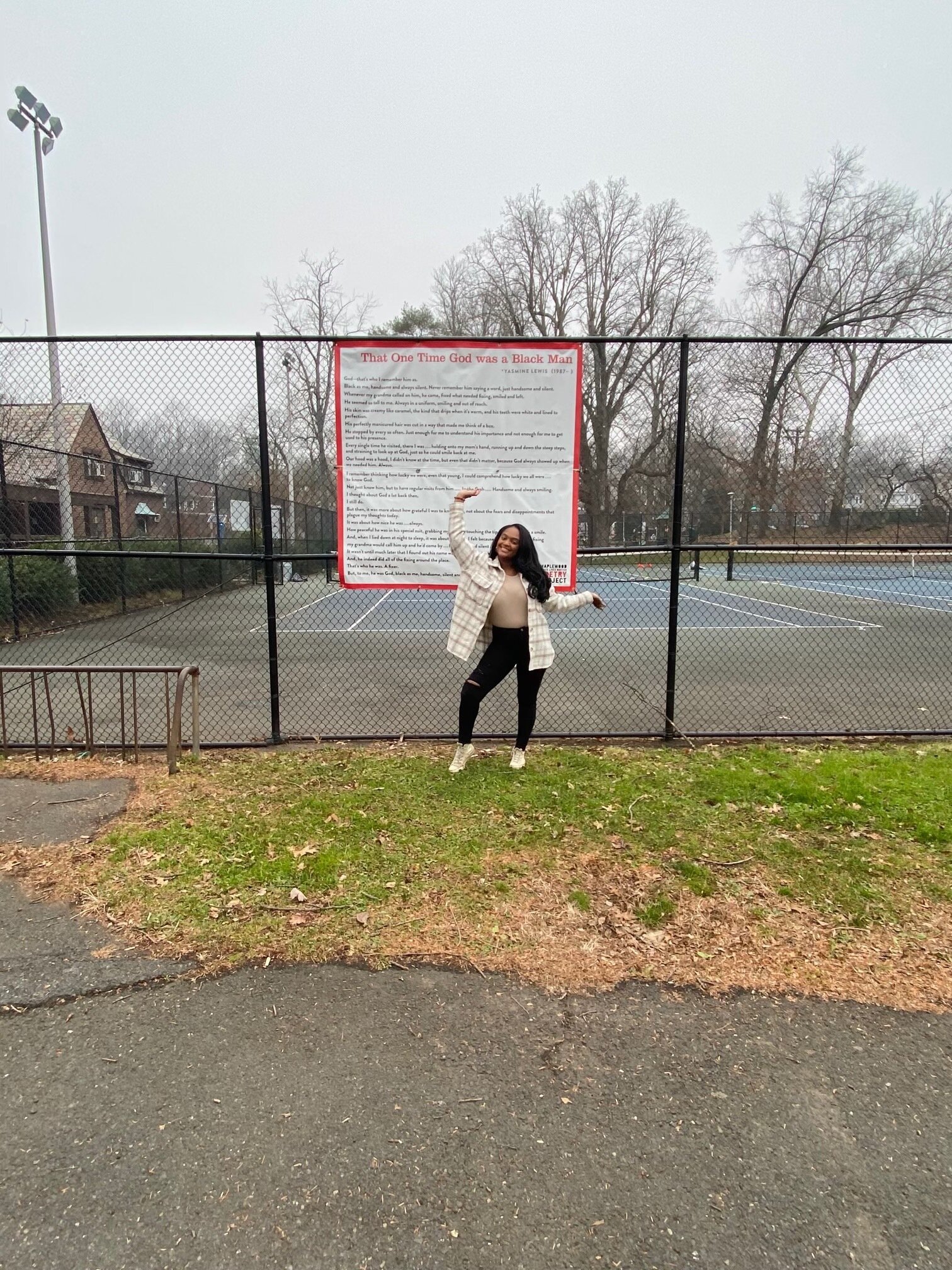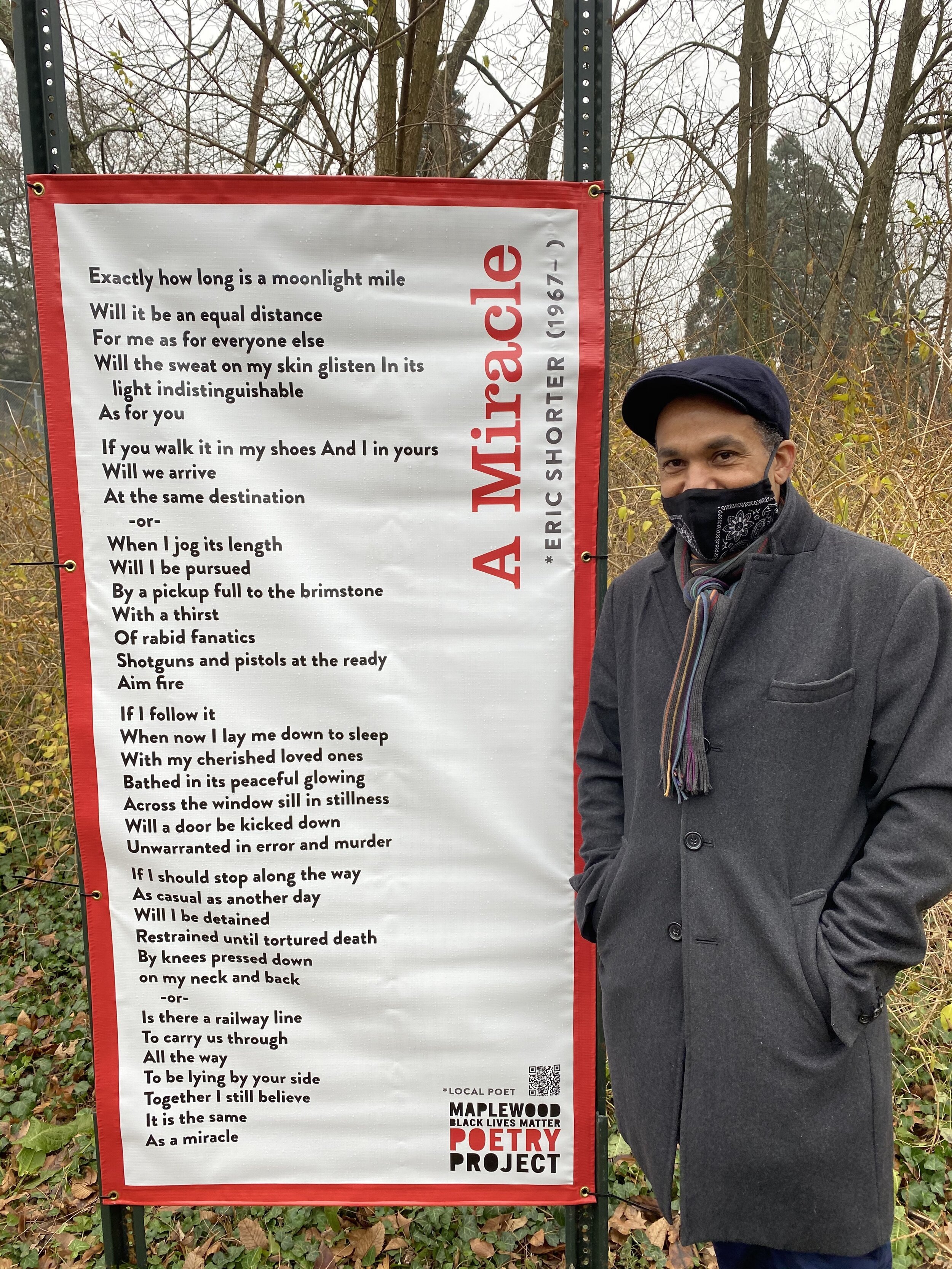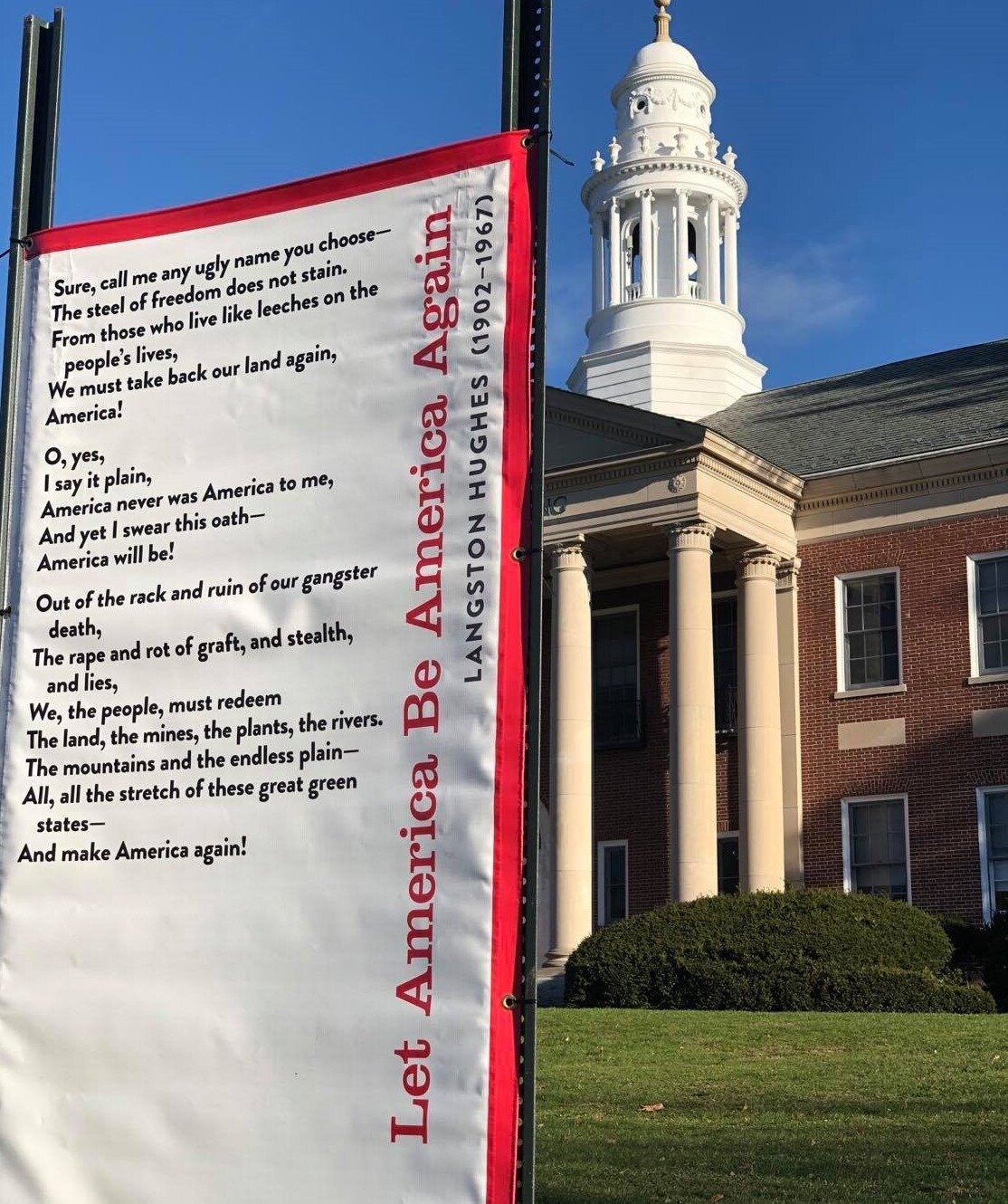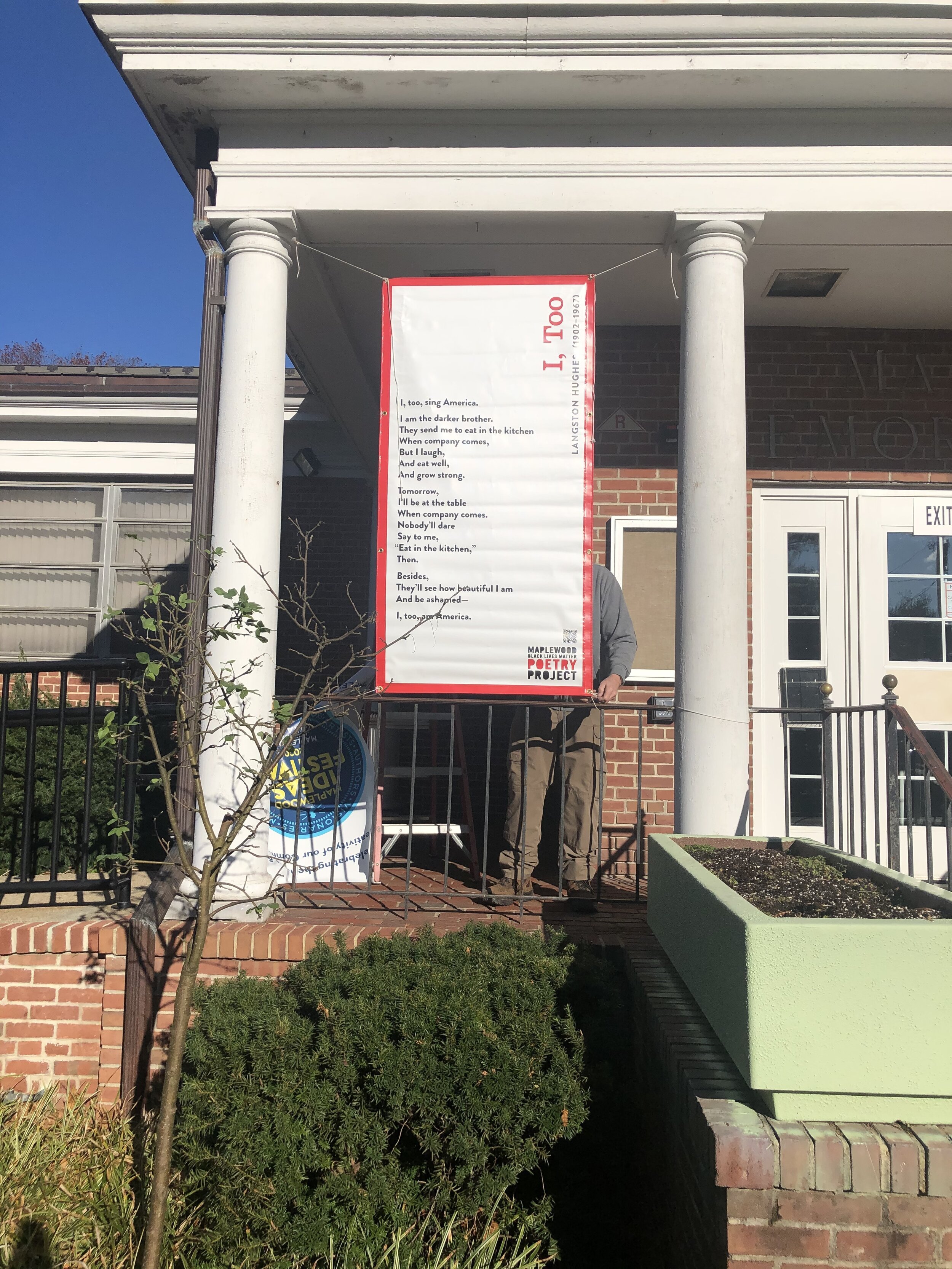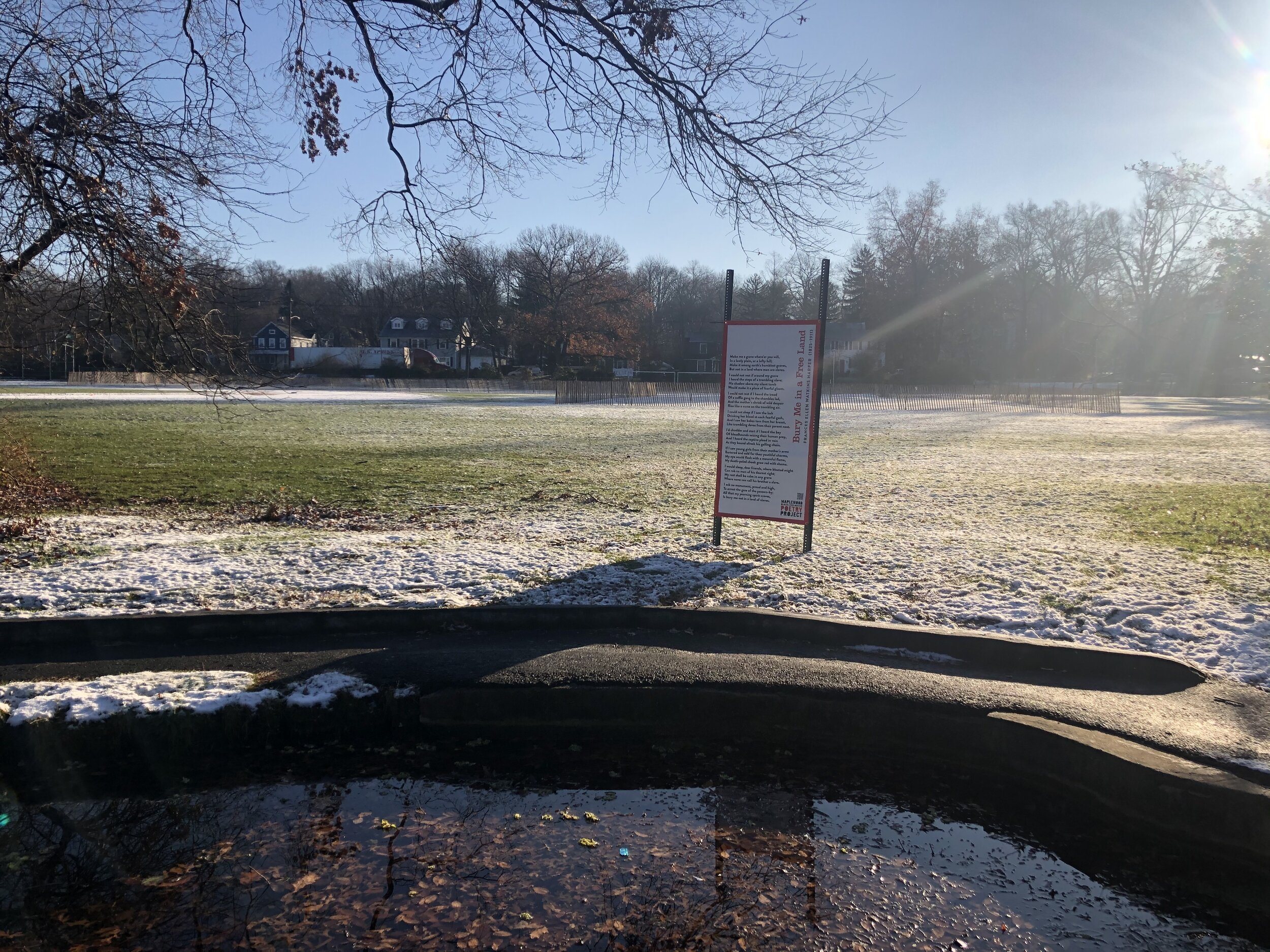“We encounter each other in words,” poet Elizabeth Alexander writes — and that is never more true than when we stand before poetry.
In February 2021, the Maplewood Black Lives Matter Poetry project displayed 38 poems by Black authors throughout Maplewood. These poets ranged from the internationally known to the local; they spanned a wide breadth of experience, age, and sensibility. Many were living, while others spoke to us from other eras. All of the pieces invited readers to engage with the power of language, and explore their relationship to the people and places in our community.
The project’s challenge to the community was to consider what it means to be free as we work against systemic racism and police brutality.
All of the poems were used with the generous permission of the authors or their estates. This project was made possible by the support of individual donations and the contributions of two local businesses: The Able Baker and [WORDS] Bookstore. The Maplewood Arts Council is grateful for each and every contribution, as well the time and energy given by a core group of local artists who made this project not just possible — but meaningful.
Featured Poets
Elizabeth Alexander
“Praise Song for the Day” (Durand @ Maplewood Avenue)
Elizabeth Alexander (born 1962) was born in Harlem, New York and grew up in Washington, D.C., the daughter of Clifford Alexander Jr., a former U.S. Secretary of the Army and Equal Employment Opportunity Commission chairman.
She is a poet, literary critic, and scholar; her volume of poetry American Sublime was shortlisted for the Pulitzer Prize in 2005, and in the same year she was awarded the Jackson Poetry Prize. Barack Obama asked her to compose and read a poem for his Presidential inauguration in 2009; her poem “Praise Song for the Day,” became a bestseller. It has been said of her that “when [her] forge is hot, the reader is transported to her world.”
Alexander is a professor of poetry at Yale University, and also a founding member of Cave Canem, an organization dedicated to promoting Black poets and poetry. She is also an important voice in Black literary criticism. Her writings on artists, writers, and aesthetics are valued for their poise and erudition.
In 1996, Alexander married Ficre Ghebreyesus, an Eritrean-American painter/chef, and they had two sons, Solomon and Simon. When Ghebreyesus died of sudden heart failure in 2012, Alexander wrote movingly about the experience of devastating loss in her memoir The Light of the World.
Shamari Alonz *Local Poet*
“Untitled” (Springfield Avenue @ Yale Street)
Shamari Alonz (born 1980) is an artist who has been creating poetry for 20 years. His affinity for the arts is immense and he considers himself to be primarily a writer. His first book, Traces of My Existence, will be published by the end of 2020. Says Alonz, “May all who gravitate to, as well as those who develop an appreciation for any of my work, please know that I appreciate YOU, for without you there would be no me.”
Maya Angelou
“Caged Bird” (Springfield Avenue Gazebo)
“Still I Rise” (DeHart Park)
“Equality” (DeHart Park)
Maya Angelou (1928-2014) was an internationally acclaimed American poet, storyteller, activist, playwright, essayist, professor, and autobiographer. In January 1993, Americans across the country watched Angelou on television as she read the poem she had written for President Bill Clinton’s inauguration. The poem, titled “On the Pulse of Morning,” calls for peace, harmony, and social justice.
Born in St. Louis, Missouri, Angelou went to work at the age of 17 as the first Black and first female streetcar conductor in San Francisco. She also worked as a dancer in nightclubs, as a short-order cook, and, in her words, “I once had a job in a mechanic’s shop, taking paint off cars with my hands.”
Her first professional successes came as a cabaret singer, dancer, and stage actress. In the late 1950s, inspired by hearing Dr. Martin Luther King, Jr. speak, Angelou determined to become a civil rights activist. She worked with King and Malcolm X, and lived in Ghana for a time as a freelance journalist. Upon her return to the U.S., she published first book, the autobiography I Know Why the Caged Bird Sings, which launched her career as a writer.
Angelou achieved widespread fame and recognition in the course of her long life. She was awarded over 50 honorary degrees and served on two presidential committees. In 2000, Angelou received the National Medal of Arts. In 2010, she was awarded the Presidential Medal of Freedom, the highest civilian honor in the U.S., by President Barack Obama. She died at 86 in 2014.
Reginald Dwayne Betts
“When I Think of Tamir Rice While Driving” (Memorial Park Duck Pond)
Reginald Dwayne Betts (born 1980) grew up in Maryland. He began reading and writing poetry while serving an eight-year prison sentence (including 14 months in solitary confinement) for a carjacking he committed at the age of 16. Upon his release, he worked in a bookstore and founded a book club for Black boys, while attending Prince George’s Community College in Largo, Maryland.
He has gone on to become the author of a memoir and three books of poetry. His memoir, A Question of Freedom: A Memoir of Learning, Survival, and Coming of Age in Prison, was awarded the 2010 NAACP Image Award for non-fiction.
When Betts was awarded the 2016 PEN New England Award for poetry for his collection Bastards of the Reagan Era, the judging committee said, “Betts has written an indelible lament for a generation, a necessary book for this American moment.”
In 2012, Betts was appointed by President Obama to the Coordinating Council of the Office of Juvenile Justice and Delinquency Prevention.
He is currently a PhD student at Yale Law School, and he has spent a year representing clients in the New Haven Public Defender’s Office.
Jericho Brown
“Say Thank You, Say I’m Sorry” (Inwood Avenue @ Maplewood Avenue)
Jericho Brown (born 1976) is an award-winning poet, college professor, LGBTI activist, and community builder. Born and raised in Shreveport, Louisiana, he graduated from Dillard University and earned graduate degrees from the University of New Orleans and the University of Houston. One of his first jobs was as a speechwriter for the Mayor of New Orleans.
His first book of poems, Please, won the American Book Award in 2008; in 2011, he received the National Endowment for the Arts Fellowship for Poetry, His third book, The Tradition, garnered widespread critical acclaim and won the 2020 Pulitzer Prize for Poetry. Brown has said of his poetry, “My poems help me understand where my talk doesn’t fit my actions, and they ask me to get my actions in line with my beliefs.”
Brown is a professor of Creative Writing and the director of the Creative Writing program at Emory University in Atlanta.
Lucille Clifton
“Study the Masters” (Springfield Avenue @ Indiana)
Lucille Clifton (1936-2010) was a prolific poet whose work celebrates Black experience, endurance through adversity, and women’s history. She is noted for saying a great deal with few words.
Her first poetry collection, Good Times, was published in 1969, and listed by The New York Times as one of the year's ten best books, and she published more than a dozen others in her life. Among her many awards were the National Book Award, the Ruth Lilly Poetry Prize, and the Robert Frost Award. From 1979 to 1985, she was Poet Laureate of the state of Maryland.
Clifton grew up in Buffalo, NY and attended Howard University and the State University of New York. She met her husband, professor and sculptor Fred James Clifton, when they were cast in a community theater production of The Glass Menagerie. They had six children. In addition to writing, Clifton taught at Columbia University, U.C. Santa Cruz, St Mary’s College, and Dartmouth. She also wrote many children’s books.
Asked how she would like to be remembered, Clifton responded, “I would like to be seen as a woman whose roots go back to Africa, who tried to honor being human. My inclination is to try to help.” (1936-2010) was a prolific poet whose work celebrates Black experience, endurance through adversity, and women’s history. She is noted for saying a great deal with few words.
Her first poetry collection, Good Times, was published in 1969, and listed by The New York Times as one of the year's ten best books, and she published more than a dozen others in her life. Among her many awards were the National Book Award, the Ruth Lilly Poetry Prize, and the Robert Frost Award. From 1979 to 1985, she was Poet Laureate of the state of Maryland.
Clifton grew up in Buffalo, NY and attended Howard University and the State University of New York. She met her husband, professor and sculptor Fred James Clifton, when they were cast in a community theater production of The Glass Menagerie. They had six children. In addition to writing, Clifton taught at Columbia University, U.C. Santa Cruz, St Mary’s College, and Dartmouth. She also wrote many children’s books.
Asked how she would like to be remembered, Clifton responded, “I would like to be seen as a woman whose roots go back to Africa, who tried to honor being human. My inclination is to try to help.”
Rita Dove
“Rosa” (Springfield Avenue @ Yale Street)
Rita Dove (born 1952), the daughter of one of the first Black chemists in the tire industry, was born and raised in Akron, Ohio. She attended Miami University in Ohio as a National Merit Scholar, won a Fulbright to study in Germany, and earned an MFA at the Iowa Writers’ Workshop.
Her poetry, known for its lyricism and beauty as well as its sense of history and political scope, has won many prizes and awards. She won the Pulitzer Prize in 1987, and was named the U.S. Poet Laureate in 1993, when she was 40—the first Black person to attain that title. She has said that she saw her appointment as “significant in terms of the message it sends about the diversity of our culture and our literature.” During her tenure, she traveled widely to give public readings in a variety of venues; she also brought writers together to explore the African diaspora through the eyes of its artists.
Dove is also the author of plays, essays, and criticism. She is currently a professor of English at the University of Virginia in Charlottesville. She and her husband, the German writer Fred Viebahn, are avid ballroom dancers and often give showcase performances. They have one daughter.
Paul Laurence Dunbar
“Sympathy” (Springfield Avenue Gazebo)
Paul Laurence Dunbar (1872-1906) was born in Dayton, Ohio, to freed slaves from Kentucky. He was one of the first influential Black poets in American literature.
Dunbar wrote and published his first book of poetry while working as an elevator operator for $4 a week; some of his first fans were passengers on his elevator. He went on to write a dozen books of poetry, along with short stories, novels, and stage works, providing vivid accounts of Black American life at the turn of the 20th century. He was particularly known for the use of Black Vernacular English in his poetry and stories. He also wrote the lyrics for the musical In Dahomey, the first all-African American musical ever produced on Broadway.
Contemporary poet Nikki Giovanni calls Dunbar “a natural resource of our people.”
When he was 25, he married writer Alice Ruth Moore and took a job at the Library of Congress in Washington D.C., attending Howard University at the same time. In 1902 he contracted tuberculosis, but he continued to write steadily until his death from the disease at the age of 33.
Ashley Lola Fanka *Local Poet*
“When America Kills Me, Make Sure They Hear Me Scream” (Parker Avenue @ Columbia High School)
Ashley Fanka (born 2003) is a poet and activist in Maplewood. She is devoted to social justice and using artistic expression to give a voice to people of color.
Ross Gay
“A Small Needful Act” (Maplewood Ave @ Able Baker)
Ross Gay (born 1974) was born in Youngstown, Ohio and grew up in Levittown, Pennsylvania. He earned a BA from Lafayette College, an MFA in Poetry from Sarah Lawrence College, and a PhD in English from Temple University.
His third book of poetry, Catalog of Unabashed Gratitude, won the 2016 Kingsley Tufts Poetry Award and was a finalist for the National Book Award and the National Books Critics Circle Award. His latest book of poems, published in 2020, is Bee Holding.
He has also written an essay collection, The Book of Delights, daily mini-essays about things that delight him, especially the small actions of individuals that create community. He has said the book is about “how we attend to the ways we make each other possible.”
Gay teaches at Indiana University and at Drew University in New Jersey; he is also an editor for several online magazines and chapbook presses. He is a founding board member of the Bloomington Community Orchard, a non-profit, free-fruit-for-all food justice and joy project.
Nikki Giovanni
“Rosa Parks” (Springfield Avenue @ Yale Street)
Nikki Giovanni (born 1943) is one of the most famous poets to emerge from the Black Power and Black Arts movements of the 1960s. She was born in Knoxville, Tennessee and grew up in Cincinnati, Ohio. She attended Fisk University, where she studied history and worked to restore the Fisk chapter of the Student Non-Violent Coordinating Committee (SNCC), continuing on to graduate studies at the University of Pennsylvania and Columbia University.
Giovanni’s first published volumes of poetry grew out of her response to the assassinations of Dr. Martin Luther King Jr., Malcolm X, Medgar Evers, and Robert Kennedy. By publicly expressing feelings of oppression and anger in her poems, she found new audiences and readers beyond the usual poetry-reading public. She went on to write many award-winning volumes of poetry, as well as children’s literature and essays. “Writing,” she has said, “is ... what I do to justify the air I breathe.”
Giovanni often gives public readings of her poetry with a backdrop of gospel or jazz music.
She is an avid supporter of slam, spoken-word poetry, and hip-hop, calling the latter “the modern equivalent of what spirituals meant to earlier generations of Blacks.” Oprah Winfrey has named Giovanni one of her “25 Living Legends.”
Giovanni, who has one son, is a professor of English at Virginia Tech.
Amanda Gorman
“In This Place (An American Lyric)” (Maplewood Avenue @ Baker Street)
Amanda Gorman (born 1998) was named the first National Youth Poet Laureate of the United States in 2017, when she was 19. Her writing focuses on the intersections of race, oppression, feminism, and adolescence.
She is also an activist who advocates for youth leadership, arts education, environmentalism, and women's rights. She is the founder/director of One Pen One Page, a nonprofit organization that provides “online platforms and creative writing programs for student storytellers to change the world.”
She frequently performs her poetry in public readings, including several nationwide television performances. “For me, being able to stand on a stage as a spoken word poet, as someone who overcame a speech impediment, as the descendent of slaves who would have been prosecuted for reading and writing—I think it really symbolizes how, by pursuing a passion and never giving up, you can go as far as your wildest dreams,” she has said.
For both her poetry and her advocacy, Gorman has received numerous awards. She is currently a student at Harvard University, and is on record as saying she wants to run for president in 2036.
Elle Guillaume *Local Poet*
“Society’s Broken Leg” (Baker Street @ Maplewood Middle School)
“My Life Matters” (Baker Street @ Maplewood Middle School)
Elle Guillaume (born 2008) is 12 years old and in the 7th grade. She loves to play soccer, listen to music, and watch movies. She also loves learning about social justice issues.
Frances Ellen Watkins Harper
“Bury Me in a Free Land” (Memorial Park @ The Duck Pond)
Francis Ellen Watkins Harper (1825-1911) was born in Baltimore, the only child of free African American parents. Until she was 13, she attended the Academy for Negro Youth, founded by her uncle, a prominent abolitionist.
As a teenager, Harper began to publish articles in anti-slavery journals. She published her first volume of poetry at the age of 20, and throughout her long life she combined her poetic work with a career as a journalist for anti-slavery newspapers; she was sometimes called “the mother of African American journalism.”
Harper was a lifelong activist as well. She became a prominent traveling speaker on the anti-slavery circuit and helped slaves escape on the Underground Railroad. In 1858, a century before Rosa Parks, she refused to ride in the "colored" section of a segregated trolley car.
She was influential in the suffragist movement but came to believe that Black reformers had to set their own priorities. At the National Women’s Rights Convention in 1866, she said, “You speak of rights. I speak of wrongs.” She was the co-founder and vice president of the National Association of Colored Women and the director of the American Association of Colored Youth.
She married Fenton Harper in 1860, and they had four children, whom she supported after his death with her speaking engagements.She died at the age of 95.
Robert Hayden
“Frederick Douglass” (Burgdorff Center for the Performing Arts, Durand Street)
Robert Hayden (1913-1980) was born and raised in Detroit. During his childhood, extreme nearsightedness caused him to turn to books instead of sports. During the 1930s, he attended Wayne State University on scholarship and then got a job researching Black history for the WPAs Federal Writers’ Project. He went on to earn a graduate degree in English literature from the University of Michigan.
Hayden wrote poems that are formal and elegant in nature and that often explore elements of Black American history and experience. Another frequent subject of his poetry is the Baha’i faith, to which he converted in the 1940s. Baha’i is an Eastern religion that believes in a coming world civilization and the unity of all humanity.
Hayden’s multiple volumes of poetry earned numerous awards, and in 1976 he became the first Black person to be appointed Consultant in Poetry to the Library of Congress. He taught at Fisk University for 20 years and, for the final decade of his career, at the University of Michigan. Hayden and his wife Emma Morris had one daughter, Erma Hayden, a pianist and composer who taught public school music.
Langston Hughes
“Let America be America Again” (Town Hall)
“I, Too” (Maplewood Memorial Library)
“I Look at the World” (Maplewood Library, Hilton Branch)
Langston Hughes (1901-1967) was one of America’s greatest poets. The enduring subject of his poetry was the reality of working-class Black lives—in his own words: “people up today and down tomorrow, working this week and fired the next, beaten and baffled, but determined not to be wholly beaten.”
Hughes also wrote novels, short stories, essays, plays, and newspaper columns, and was a major figure in the Harlem Renaissance of the 1920s, an era of extraordinary intellectual, literary, and artistic vitality in Harlem and other American cities.
Hughes was born in Langston, Missouri, came to New York City as a young man, studied briefly at Columbia University, and then spent several years in Europe. Before he became a public writer, he worked as a truck farmer, cook, waiter, sailor, and a doorman at a nightclub in Paris. For most of his adult life, he lived in Harlem.
Often called a “poet of the people,” Hughes spent many years traveling the country doing public readings of his poetry. He was the first Black person in the United States to earn his living solely from his writing and public lectures.
Shawn R. Jones *Local Poet*
“Hypoglycemia during the COVID-19 crisis” (Maplewood Avenue @ Baker Street)
Shawn R. Jones (born 1968) is the author of two poetry chapbooks, Womb Rain (Finishing Line Press 2008) and A Hole to Breathe (Finishing Line Press 2015). Her work has also appeared in Essence, Challenges for the Delusional, River Heron Review,Guesthouse, Typehouse, and Peregrine Journal. She is a graduate of Rutgers-Camden’s MFA Program.
Yusef Komunyakaa
“African Burial Ground” (Memorial Park Duck Pond)
Yusef Komunyakaa (born 1947) is a poet whose distinctive style uses vernacular speech layered with syncopated rhythms from jazz traditions. Born in Bogalusa, Louisiana, the son of a carpenter, Komunyakaa learned the power of language through his grandparents, who were church people. “The sound of the Old Testament informed the cadences of their speech, and was my first introduction to poetry,” he has said. As an adult, he reclaimed the name Komunyakaa, said to be his grandfather's African name.
Komunyakaa served in the Vietnam War as a correspondent; he was managing editor of the Southern Cross during the war, for which he received a Bronze Star. The GI Bill enabled him to earn a BA from the University of Colorado Springs and an MFA from the University of California-Irvine.
His fifth book of poetry, Dien Cai Dau, explores the experience of Black soldiers in Vietnam in stark and personal terms and won the Dark Room Poetry Prize. He has won numerous other prizes for his work, including the Pulitzer Prize, the Kingsley Tufts Poetry Award, and the Wallace Stevens Award. He currently serves as Distinguished Senior Poet in New York University’s graduate creative writing program.
Audre Lorde
“Coal” (Memorial Park @ Maplewood Train Station)
Audre Lorde (1934-1992), who described herself as a “Black lesbian feminist poet mother,” was a central figure in the liberation movements of her time, including feminism, civil rights and Black cultural movements, and struggles for LBGTQ equality. Much of her poetry constitutes a blazing call for racial justice and for the intersectionality of women’s experience, transmuted into the language of art.
Lorde was born in New York City to West Indian immigrant parents. In the 1960s, she earned degrees at Hunter College and Columbia University and worked as a public school librarian. The release of her poetry volume Coal in 1976 established her as an influential voice in the Black Arts Movement.
In 1981, she co-founded Kitchen Table: Women of Color Press, dedicated to supporting Black Feminist writers. Her activism was international; she helped to launch the Afro-German movement and to create the anti-apartheid organization Sisterhood in Support of Sisters in South Africa.
Lorde also wrote nonfiction prose, including the groundbreaking The Cancer Journals. A professor of English at John Jay College and Hunter College, Lorde was named poet laureate of New York in 1991. In an African naming ceremony before her death in 1992, she took the name Gamba Adisa, which means “Warrior: She Who Makes Her Meaning Known.”
Yasmine Lewis *Local Poet*
“That One Time God Was a Black Man” (Memorial Park @ Basketball Court)
Yasmine Lewis (1987) is a local artist from Maplewood, NJ. Her work is inspired by matriarchal traditions and represent a recollection of memories that highlight the Black experience through various perspectives. Yasmine is a professional writer for a Fortune 500 company and enjoys photography in her spare time.
Harryette Mullen
“Elliptical” (Springfield Avenue @ Cornbread)
“We Are Not Responsible” (Maplecrest Park)
Haryette Mullen (born 1953) is a poet, short story writer, and literary scholar. She is particularly known as a poet who traces the interactions of race, sex, gender, and consumer culture in thought-provoking ways, interwoven with humor. It’s been said that reading Mullen’s poetry “"is a bit like hearing a new musical instrument for the first time, playing against a prevalent social construction of reality."
Mullen was born in Alabama and grew up in Fort Worth, Texas. She attended the University of Texas and attended graduate school at the University of California. A number of her poems grow out of a creative family history project based on memory, oral storytelling, research, and documentation. Another main focus of interest for her is the interplay between vernacular language and standard English. She has said, “In my practice as a poet, I try to combine critical thinking with the pleasures of rhythm and wordplay.”
Among her many awards are the Gertrude Stein Award for innovative poetry, the PEN/Beyond Margins Award, and the Jackson Poetry Prize. Mullen is a professor of English at the University of California, Los Angeles, where she also teaches creative writing and African American literature. She lives in Los Angeles.
Ogenna Oreadu *Local Poet*
“why do you want me dead?” (Parker Street @ Columbia High School)
Ogenna Oraedu (born 2003) is a Senior at Columbia High School and resides in South Orange. She is Nigerian-American and is a part of different social justice groups in the community, including CHS’s MAC program, the MAPSO Youth Coalition, and the Community Coalition on Race’s Youth Collective.
Claudia Rankine
“Weather” (Maplewood Avenue @ Baker Street)
Claudia Rankine (born 1963) is a poet and playwright who has been called “one of our essential thinkers about race, difference, politics, and the United States of America.” Her work boldly experiments with genres and often mixes poetry and prose with historical documents and social media posts.
Rankine was born in Kingston, Jamaica, and raised mostly in the Bronx, New York. She earned a BA at Williams College and an MFA at Columbia University. She has published several collections of poetry, including Citizen: An American Lyric (2014), a finalist for the National Book Award and winner of the National Book Critics Circle Award.
With the funds from a MacArthur Genius Grant, Rankine founded and curates the Racial Imaginary Institute, a think tank for artists and writers who study whiteness and examine race as a construct. In 2017, she collaborated with choreographer and performer Will Rawls to generate the What Remains. She also creates multi-genre works with her husband, filmmaker John Lukas.
Rankine is currently a professor at Yale University; she will move to a post at New York University in summer 2021.
Eric Shorter *Local Poet*
“A Miracle” (Memorial Park @ Foot Bridge)
Eric Shorter (born 1967) is an old pro poet from the early days of Slam in the '90s. His writing has appeared in Frank151, Mugshot Magazine, The Passionfruit Review, and Intellectual Refuge. A recent double EP record of his work was released under the artist name, EJS on Birs Recordings. Eric currently teaches elementary school and resides in Maplewood, NJ with two of his three daughters still at home.
Tracy K. Smith
“Unrest in Baton Rouge” (Springfield Avenue @ Maplewood Tire)
“Wade in the Water” (Maplewood Avenue @ Ricalton Square)
Tracy K. Smith (born 1972) was named United States Poet Laureate in 2017 and served two consecutive year-long terms. She understood this honor as a mandate to take poetry on the road around the nation, focusing primarily on rural areas where most writers are unlikely to visit. She has said: “I want to go to places where writers don’t usually go, where people like me don’t usually show up, and say: ‘Here are some poems. Do they speak to you? What do you hear in them?’ I think there are lots of places where we have something very clear, compelling, and welcome to say to one another.”
Smith was born in Massachusetts and raised in northern California. She earned a BA from Harvard University and an MFA in creative writing from Columbia University. She has published four books of poetry. She won a Pulitzer Prize for her third book, Life On Mars, which pays homage to her father’s life and work as an engineer on the Hubble Telescope.
In 2015 she published a memoir, Ordinary Light, which was a finalist for the National Book Award in nonfiction. In addition, she hosted the daily podcast “The Slowdown,” which featured one poem in each short episode.
Smith teaches creative writing at Princeton University and is the Chair of Princeton's Lewis Center for the Arts. She lives in Princeton with her husband, literature professor Raphael Allison, and their three children.
Heru Stewart *Local Poet*
“How Doves Come to Tears” (Ridgewood Road @ Jefferson School)
Heru Stewart (born 1991), otherwise known as Ras Heru, is a Newark NJ-born poet, performer, artist-entrepreneur and elementary school teacher. A creative writing workshop producer and publisher, Heru’s creative and professional endeavors reflect his purpose in using the creative word and other avenues of art to spark engaging thoughts, conversations, and relationships between all those he and his works are able to reach. “How Doves Come to Tears”, a poem very dear to Heru, can be found in his debut full-volume collection of poems, entitled The Book of Heru: A Poet’s Portrait .
Amina Swarns *Local Poet*
“Upon the Concept of Diversity” (Baker Street @ Maplewood Middle School)
Amina Swarns (born 2008) is 12 years old. She is in the 7th grade at the Kent Place School. She is a social justice warrior, an avid reader and an aspiring author.
Nubia DuVall Wilson *Local Poet*
“The Burden of Racism” (Baker Street near Maplewood Avenue)
Nubia Duvall Wilson is an author, poet, journalist, and consultant. She is also an activist and advocate for survivors of sexual abuse; she speaks to organizations around the country to break the silence around this issue. Her first novella, The Survivors’ Club, was inspired by her own journey toward healing as a survivor of childhood sexual abuse.
Wilson’s professional writing career began at Real Simple magazine in 2006. Her editorial work has covered a wide range of topics, including travel, consumer products, women's lifestyle, and health. She is also the founder and owner of Cielo Consulting, a boutique public relations and marketing agency.
Wilson graduated from Barnard College, Columbia University with a degree in English and a minor in Religion. She lives in South Orange, New Jersey with her husband, daughter, and son.
Jacqueline Woodson
“February 12, 1963” (Maplewood Avenue @ Ricalton Square)
Jacqueline Woodson (born 1963) was born in Columbus, Ohio and grew up in Greenville, South Carolina and Brooklyn, New York. She is the author of over 30 books for children and young adults.
The poem “February 12, 1963” is part of her novel in verse Brown Girl Dreaming, which won the National Book Award and the Newbery Honor Award.
Woodson consciously writes for a readership of children and young people. Her work is filled with strong, emotional storylines and a sense of optimism. "If you love the people you create, you can see the hope there," she has said.
She served as the Poetry Foundation’s Young People's Poet Laureate from 2015 to 2017 and was named the National Ambassador for Young People's Literature for 2018-19 by the Library of Congress. She was named a MacArthur Fellow in 2020.
Woodson lives in Park Slope, Brooklyn, with her partner Juliet Widoff, a physician. Woodson and Widoff have a daughter, Toshi Georgianna, and a son, Jackson-Leroi.
LeShannon Wright *Local Poet*
“#I March” (Springfield Avenue @ Yale Street)
LeShannon Wright (born 1987), is a passionate entrepreneur, who leads a multifaceted career. She is a poet, author, TedX speaker, technologist, business owner of “Turning Tulips,” and a podcaster hosting “The Origami of Pain.” Her life long mission is it to empower, promote equity, and drive change on important issues that matter.



